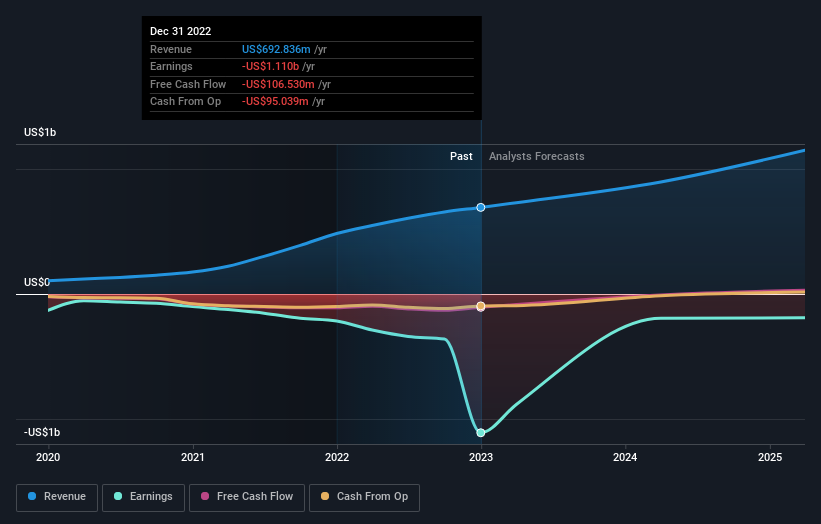Institutional owners may consider drastic measures as Lightspeed Commerce Inc.'s (TSE:LSPD) recent CA$243m drop adds to long-term losses
Key Insights
Given the large stake in the stock by institutions, Lightspeed Commerce's stock price might be vulnerable to their trading decisions
The top 9 shareholders own 51% of the company
A look at the shareholders of Lightspeed Commerce Inc. (TSE:LSPD) can tell us which group is most powerful. We can see that institutions own the lion's share in the company with 62% ownership. In other words, the group stands to gain the most (or lose the most) from their investment into the company.
And institutional investors saw their holdings value drop by 7.3% last week. The recent loss, which adds to a one-year loss of 39% for stockholders, may not sit well with this group of investors. Also referred to as "smart money", institutions have a lot of sway over how a stock's price moves. As a result, if the downtrend continues, institutions may face pressures to sell Lightspeed Commerce, which might have negative implications on individual investors.
In the chart below, we zoom in on the different ownership groups of Lightspeed Commerce.
Check out our latest analysis for Lightspeed Commerce
What Does The Institutional Ownership Tell Us About Lightspeed Commerce?
Many institutions measure their performance against an index that approximates the local market. So they usually pay more attention to companies that are included in major indices.
We can see that Lightspeed Commerce does have institutional investors; and they hold a good portion of the company's stock. This implies the analysts working for those institutions have looked at the stock and they like it. But just like anyone else, they could be wrong. When multiple institutions own a stock, there's always a risk that they are in a 'crowded trade'. When such a trade goes wrong, multiple parties may compete to sell stock fast. This risk is higher in a company without a history of growth. You can see Lightspeed Commerce's historic earnings and revenue below, but keep in mind there's always more to the story.
Since institutional investors own more than half the issued stock, the board will likely have to pay attention to their preferences. Lightspeed Commerce is not owned by hedge funds. The company's largest shareholder is Caisse de dépôt et placement du Québec, with ownership of 16%. Meanwhile, the second and third largest shareholders, hold 11% and 9.3%, of the shares outstanding, respectively. Dax Dasilva, who is the third-largest shareholder, also happens to hold the title of Chairman of the Board.
On further inspection, we found that more than half the company's shares are owned by the top 9 shareholders, suggesting that the interests of the larger shareholders are balanced out to an extent by the smaller ones.
While studying institutional ownership for a company can add value to your research, it is also a good practice to research analyst recommendations to get a deeper understand of a stock's expected performance. There are a reasonable number of analysts covering the stock, so it might be useful to find out their aggregate view on the future.
Insider Ownership Of Lightspeed Commerce
The definition of an insider can differ slightly between different countries, but members of the board of directors always count. Management ultimately answers to the board. However, it is not uncommon for managers to be executive board members, especially if they are a founder or the CEO.
Insider ownership is positive when it signals leadership are thinking like the true owners of the company. However, high insider ownership can also give immense power to a small group within the company. This can be negative in some circumstances.
Our information suggests that insiders maintain a significant holding in Lightspeed Commerce Inc.. It is very interesting to see that insiders have a meaningful CA$309m stake in this CA$3.1b business. Most would say this shows a good degree of alignment with shareholders, especially in a company of this size. You can click here to see if those insiders have been buying or selling.
General Public Ownership
With a 27% ownership, the general public, mostly comprising of individual investors, have some degree of sway over Lightspeed Commerce. This size of ownership, while considerable, may not be enough to change company policy if the decision is not in sync with other large shareholders.
Next Steps:
It's always worth thinking about the different groups who own shares in a company. But to understand Lightspeed Commerce better, we need to consider many other factors. Case in point: We've spotted 1 warning sign for Lightspeed Commerce you should be aware of.
Ultimately the future is most important. You can access this free report on analyst forecasts for the company.
NB: Figures in this article are calculated using data from the last twelve months, which refer to the 12-month period ending on the last date of the month the financial statement is dated. This may not be consistent with full year annual report figures.
Have feedback on this article? Concerned about the content? Get in touch with us directly. Alternatively, email editorial-team (at) simplywallst.com.
This article by Simply Wall St is general in nature. We provide commentary based on historical data and analyst forecasts only using an unbiased methodology and our articles are not intended to be financial advice. It does not constitute a recommendation to buy or sell any stock, and does not take account of your objectives, or your financial situation. We aim to bring you long-term focused analysis driven by fundamental data. Note that our analysis may not factor in the latest price-sensitive company announcements or qualitative material. Simply Wall St has no position in any stocks mentioned.
Join A Paid User Research Session
You’ll receive a US$30 Amazon Gift card for 1 hour of your time while helping us build better investing tools for the individual investors like yourself. Sign up here

 Yahoo Finance
Yahoo Finance 

